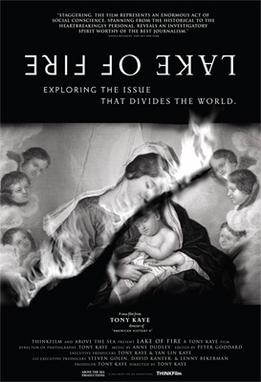Lake of Fire (film)
Lake of Fire is a documentary film directed by Tony Kaye that explores the complexity of the abortion debate in the United States. Released in 2006, the film presents a nuanced perspective on the highly polarized issue, featuring interviews with individuals from both sides of the debate, including activists, women who have had abortions, and physicians who perform them. Shot in black and white over a period of nearly 20 years, Lake of Fire seeks to provide an in-depth look at the ethical, moral, and legal aspects surrounding abortion.
Synopsis[edit | edit source]
Lake of Fire delves into the abortion debate without advocating for one side over the other. Instead, it presents a series of interviews, protests, and graphic footage intended to provoke thought and discussion among viewers. The film addresses various aspects of the issue, including the arguments for and against abortion, the implications of the Roe v. Wade decision, and the violent acts committed by extremists, such as the murder of abortion providers. By presenting these elements in a stark, black-and-white format, Kaye emphasizes the complexity and intensity of the debate.
Production[edit | edit source]
The film was directed and produced by Tony Kaye, who is also known for his work on American History X. Kaye's approach to the subject matter of Lake of Fire was to document the abortion debate comprehensively, which led him to spend nearly two decades filming and editing the project. The choice to shoot in black and white was a deliberate one, aimed at creating a timeless quality and focusing the viewer's attention on the content of the interviews and events rather than the visual aspects.
Reception[edit | edit source]
Upon its release, Lake of Fire received critical acclaim for its balanced handling of a contentious issue and its powerful visual style. Critics praised the film for its ability to provoke thought and discussion, regardless of the viewer's personal stance on abortion. However, the graphic content and unflinching portrayal of the realities of abortion and anti-abortion activism have made it a challenging watch for some audiences.
Impact[edit | edit source]
Lake of Fire is considered an important work in the realm of documentary filmmaking for its exhaustive exploration of the abortion debate in the United States. It has been used in educational settings and discussion forums as a tool to encourage critical thinking and dialogue about the ethical, moral, and legal issues surrounding abortion.
See Also[edit | edit source]
Search WikiMD
Ad.Tired of being Overweight? Try W8MD's physician weight loss program.
Semaglutide (Ozempic / Wegovy and Tirzepatide (Mounjaro / Zepbound) available.
Advertise on WikiMD
|
WikiMD's Wellness Encyclopedia |
| Let Food Be Thy Medicine Medicine Thy Food - Hippocrates |
Translate this page: - East Asian
中文,
日本,
한국어,
South Asian
हिन्दी,
தமிழ்,
తెలుగు,
Urdu,
ಕನ್ನಡ,
Southeast Asian
Indonesian,
Vietnamese,
Thai,
မြန်မာဘာသာ,
বাংলা
European
español,
Deutsch,
français,
Greek,
português do Brasil,
polski,
română,
русский,
Nederlands,
norsk,
svenska,
suomi,
Italian
Middle Eastern & African
عربى,
Turkish,
Persian,
Hebrew,
Afrikaans,
isiZulu,
Kiswahili,
Other
Bulgarian,
Hungarian,
Czech,
Swedish,
മലയാളം,
मराठी,
ਪੰਜਾਬੀ,
ગુજરાતી,
Portuguese,
Ukrainian
Medical Disclaimer: WikiMD is not a substitute for professional medical advice. The information on WikiMD is provided as an information resource only, may be incorrect, outdated or misleading, and is not to be used or relied on for any diagnostic or treatment purposes. Please consult your health care provider before making any healthcare decisions or for guidance about a specific medical condition. WikiMD expressly disclaims responsibility, and shall have no liability, for any damages, loss, injury, or liability whatsoever suffered as a result of your reliance on the information contained in this site. By visiting this site you agree to the foregoing terms and conditions, which may from time to time be changed or supplemented by WikiMD. If you do not agree to the foregoing terms and conditions, you should not enter or use this site. See full disclaimer.
Credits:Most images are courtesy of Wikimedia commons, and templates Wikipedia, licensed under CC BY SA or similar.
Contributors: Prab R. Tumpati, MD

